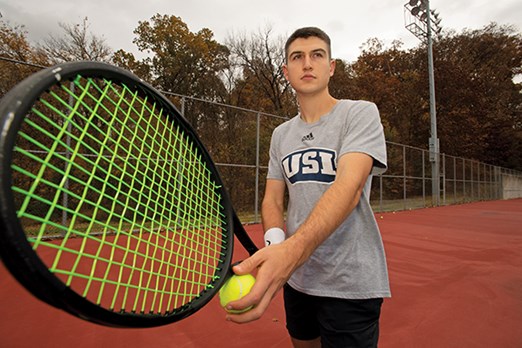Alumni Resources
About the University

MAJOR AND GRAD YEAR?
I’m a double major in accounting and economics. I graduate in May 2022 and aspire to be a Certified Public Accountant (CPA).
FAVORITE PRE-MATCH HYPE SONG?
I don’t really have a favorite—it depends on my mood. There are times when I need mellow types of music to calm my nerves, and other times I like songs that’ll hype me up. I like most all genres.
WHAT DOES IT MEAN TO YOU TO BE A USI ATHLETE?
It’s both an honor and a privilege to be a USI athlete. I’m lucky I’ve remained healthy enough these last three years and have been able to compete and represent USI in a way I’m proud of. I’m also thankful that my coach, Chris Crawford, took me on as a recruit (even with my lack of experience). Overall, I love playing as a Screagle.
WHAT’S THE BIGGEST LESSON YOU’VE LEARNED SO FAR IN YOUR USI ATHLETIC CAREER?
I’ve realized over the years that no one is going to do the hard work for you, and this is especially important in a somewhat individualized sport like tennis. Tennis players can’t pass the ball to a teammate on an off day, so it’s important to prepare adequately (it takes a special initiative to be great). It’s easy to place blame on others for scheduling, training methods, etc., and it’s hard to put in the extra time needed to improve, but I will say the latter option is always worth it. All things considered, I’ve learned important skills like discipline and time management.
WHAT IS THE BIGGEST MISCONCEPTION YOU GET ABOUT BEING A STUDENT-ATHLETE?
I often hear the stereotype that student-athletes aren’t really always “students” and we only care about athletics. That simply isn’t true. My team has a very respectable GPA, and I’d like to think we all have great careers ahead of us. My focus in particular isn’t solely on sports. I’ve been able to balance athletics with my academic and professional goals, too.
WHAT’S YOUR GO-TO POST-MATCH MEAL/SNACK?
Carbohydrates! Contrary to what people might think, carbs are not “the devil.” They allow athletes to (1) feel energized/fueled and (2) recover after a contest. I love breads, pastas and potatoes as well as fruits and vegetables. For a snack, I’m always eating something with peanut butter in it.
REFLECT ON YOUR FAVORITE MATCH AND WHY.
One of my favorite matches was from a few years ago. My freshman year, we played Drury University in the first round of the conference tournament. Though we lost, it was an all-around high-level match, and it showed that we can compete with one of the best teams in the conference. There was a lot of energy, and it was a fun match. More recently, we played Walsh University and won convincingly. It was filled with tight matches, but we overcame with grit, and that’s always a good feeling.
WHAT IS THE TRAINING PROCESS LIKE FOR TENNIS?
I always tell people tennis can be like a track meet, but it also tests your endurance. It’s filled with a bunch of little sprints needed to get to the ball, and good training is designed to reflect that. On the court, it’s common to drill some and also play practice points. Off the court, I enjoy lifting weights, plyometrics (i.e., jump training), HIIT cardio workouts, yoga/stretching and the like. It’s fun because tennis players need to train a variety of muscles (and in different ways) in order to perform well physically, and this keeps training from getting too boring.
WHAT IS YOUR INNER THOUGHT PROCESS WHEN PLAYING IN A MATCH?
To be honest, I think I do better when I stop thinking and just enjoy playing. In reality, I try to figure out what’s going on in the match. Strategically, I analyze who is winning the point and how. I ask myself questions like “Is my forehand/backhand better than theirs?” and “Do I move better than my opponent?” I adapt my play based on the answers to those questions. In a sport like tennis, there are ebbs and flows. It’s great to be playing well, but it’s also necessary that you stay positive in the bad times, too—otherwise, the wheels can fall off so to speak.